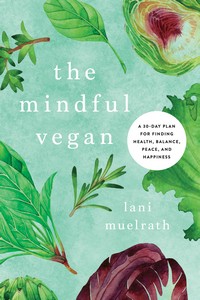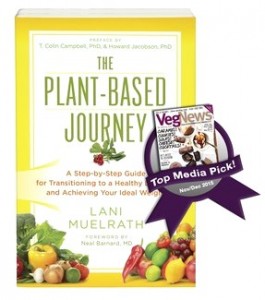
What should you eat before and after your workout?
Trendy marketing materials and the supplement industry push shakes, powders, and special supplements. But what if you are more interested in the real food, plant-based diet solution?
Does meal timing making a difference?
Exercise enthusiasts – those who exercise regularly to improve their strength, stamina, muscle power and body composition – will find that proper nutrition can give them an energetic edge. That goes for the active person eating a plant-based diet as well.
Good nutrition and regular exercise are critical in helping you achieving your best health and physiological function. Yet to optimize your results, it is also important to pay attention to nutrient timing – when you eat what – as a player in helping you to successfully achieve your health and fitness goals. The guidelines are simple, yet important – not only so that you don’t run out of fuel during your exercise bout, but so you can get the most benefit out of your workout time investment.
We now know that nutrient timing helps to repair tissue damage, restore physiological function, replenish glycogen stores – the necessary energy supply for your workouts – and promote muscle growth. No more “staying hungry” or exercising on empty if you want to optimize your training time, including both the workout you have just completed and the next one down the road.
It’s the glycogen that gets -and keeps – you going
Glycogen is the form in which your body stores glucose from the carbohydrates that you eat in your muscles and liver. Exercise depletes your glycogen stores. Right after you exercise, your insulin – the hormone that controls your blood sugar levels and shuttles glucose into muscles for storage as glycogen – is particularly sensitive and poised for action.
Carbohydrate or protein?
The bulk of the evidence minimizes the impact of protein ingestion as an enhancer of muscle glycogen resynthesis after prolonged aerobic exercise, provided that sufficient carbohydrate is eaten in the optimal post-workout window. At the same time, eating relatively small doses of protein can clearly enhance net muscle protein synthesis while in recovery from both endurance and resistance exercise.
The good news is with whole plant foods such as starchy vegetables, whole grains, vegetables, and legumes, it is easy to get both carbohydrate and protein in post-workout meals. The trick, however, is with the timing.
Meal timing after exercise – don’t miss the 45 minute window
Consuming a carbohydrate-rich, protein moderate food source within 30 – 45 minutes after exercise, followed by additional feedings in the hours that follow, will optimize muscle glycogen replacement and protein synthesis. Delaying the ingestion of a post-workout meal by several hours hampers the rate at which your body is able to store glycogen.
For the average exerciser, this means simply eating a piece of fruit for an immediate post-workout snack, followed shortly – within the first 45 minutes after your workout – with a mixed high carbohydrate and protein meal in an approximate 4:1 ratio of 4 parts carbohydrate to one part protein.
No need to run your plate through macronutrient analysis; think a starchy vegetable or whole grain complemented by beans or legumes. To give you a visual, rice, vegetables and tofu, or lentil soup with winter squash or sweet potatoes and greens are examples of a simple solution. This will deliver approximate values of the 4:1. The accompanying Simple Lentil Soup video provides a perfect example. People don’t eat isolated macronutrients, we eat real food.
Keep in mind that heavily training endurance or strength training athletes will need more quantities, more often. Susan Levin, MS, RD, Certified Specialist in Sports Dietetics, concurs with my view that foods that benefit athletic activity can be somewhat individualized. She advises that every individual should experiment with different types of foods, at different times and amounts. This can be true especially before and during exercise when such choices can directly impact performance.
Pre-workout meal
Typically, less food should be consumed the closer one gets to event time. Says Levin,
A 140 pound person might be able to tolerate about 250 grams of carbohydrate four hours before exercise but only about 60 grams one hour before exercise. This is approximately the difference between a meal containing two cups of rice (90 grams), ten spears of broccoli (25 grams), one cup of lentils (40 grams), a slice of French bread (40 grams), and a baked potato (40 grams) versus two pieces of fruit (30 grams x2). Figuring out where one lies on the tolerance spectrum is all part of the importance of training!
For most of us, there is no need for extra attention to fuel during workouts 60 to 90 minutes in length. As long as we’ve been well fed early in the day and paid attention to post-workout fueling after our last exercise session, we’ll have all the steam we need.
For the competitive athlete
When one is engaged in prolonged, more intense training sessions or events – such as marathons and high level sports training – it can be critical to performance to ingest carbohydrates during performance. As in pre-event meals, individual tolerance is key. A good rule of thumb is 30 to 60 grams of carbohydrate every hour of training. There are pre-packaged bars, gels, and beverages have carbohydrates in perfect amounts to fuel such activity, and beverages provide the added benefit of rehydrating your body. Again, for fitness enthusiasts, this is not so much of a concern as for those who train for longer, more intense periods each week.
Levin suggests that another way to look at this refueling window, in addition to the carb/protein ratio strategy noted above, is to work with a ratio of carbohydrate to body weight. She also has more ‘real food’ ideas for post-workout meals, my preference over powders or potions, suggesting that about 1.5 grams of carbohydrate for every kilogram of body weight is a good rule of thumb. As an example, for the 140 pound athlete, that equals about 95 grams of carbs – just about what you might find in one large bagel. By adding a small amount of protein to this carbohydrate snack, such as a dab of hummus, you may enhance muscle protein synthesis – that means rebuilding muscle as well as building new muscle. Simply repeat this intake every couple of hours for six hours post exercise.
Take action
Using these ideas as a point of reference, compare your exercise meal timing to see if there might be some way you can optimize athletic performance by tweaking the timing of your meals. The rules come down to this:
- be sure to fuel up before you exercise, and
- take advantage of the post-exercise window to restock muscle and liver stores. For most of us, this means packing a piece of fruit for a post-workout snack, and then eating a mixed high carbohydrate and protein meal. As an example, my client Val had long been plagued with running out of steam quite quickly into her workouts. She also found it hard to recoup energy for the rest of her day. When I coached her with regards to the “carbohydrate window” – she simply ate an apple or other piece of fruit soon after her workouts. This completely changed her energy profile for not only the rest of her day, but for her next workout.
Remember – the competitive athlete who is engaged in physical challenge for hours may need more specialized fuel sources – but for most of us, you can use real, whole plant foods to do get the job done.





Wonderful article! I’m so sick of the protein powder push and it’s very affirming to read what you have to say and have Susan’s information too. I’ve got a couple of friends I’ve just linked this article to in email as you explain things so well.
Loved the TV spot, you did such a great job!
Jen
Jen,
I so appreciate your comments and am thrilled that you like the article and TV spot. Thank you!
Lani
Great article. I think I may have been fueling too much immediately before I run. Have heard that digestion during a workout is an energy drain. Any suggested foods pre-workout?
Thanks Robert! “Pre” is addressed in the article – yes?
Something light such as fruit or toast can be a good choice if very close to workout time.
Lani
I like to exercise early in the morning. Should I be eating something before I exercise? Does it make a difference?
thanks for all you share!
Jennifer
Jennifer,
Yes, and I’ll tell you why. Assuming you want to get the most out of your workout, that means you’d want to have the most stamina and energy ready to go. In the morning, your glycogen stores in your muscles and liver and largely depleted – which means running out of steam faster, decreasing energy for your workout. By fueling up first even with a light meal you avail yourself of more immediate energy, making it possible for you to work out harder and longer.
Here’s more:
https://lanimuelrath.com/exercise/readers-ask-does-working-out-before-breakfast-burn-more-fat-muscle-or-hurt-my-workout/
Thanks for your comments today!
Lani